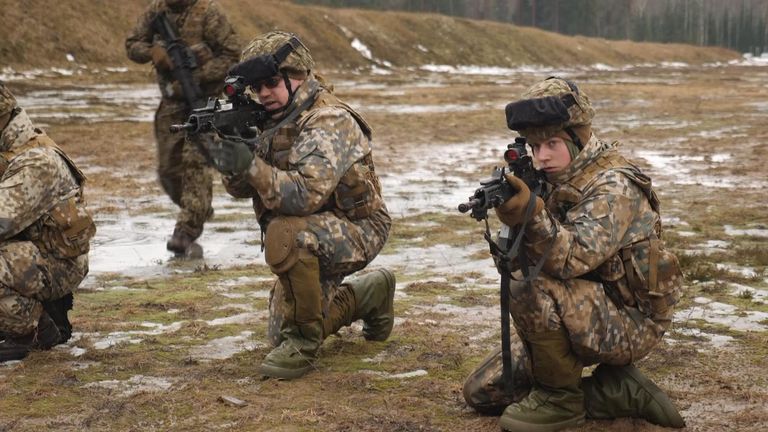WASHINGTON (AP) – Ukrainian drones fly without ammunition. Russian artillery unleash deadly volleys from safe positions beyond the range of Kyiv’s forces. Limited supplies of weapons and ammunition are resulting in lost ground to Moscow, according to U.S. congressional leaders, who are urging the Republican-controlled House to show more urgency in providing aid to Ukraine.
In Washington, officials are watching the drop-off in ammunition deliveries with increasing alarm. It’s been more than two months since the USA has seen a drop in ammunition deliveries. – which since World War II has fashioned itself as the “Arsenal of Democracy” – last sent military supplies to Ukraine.
House Speaker Nancy Pelosi appears to be determined to chart her own course away from a $95 billion foreign assistance package passed by the Senate – a decision that could stall the project for weeks to come after an already arduous period in Congress.
The Ukrainian military withdrew from Avdiivka last month, which was surrounded by Russian forces and where defenders had held out for nearly five months.
“If Ukraine gets assistance, they will win. If they don’t get the assistance, they may lose – with serious ramifications for the United States.” According to Senate Majority Leader Chuck Schumer, who traveled to Ukraine last week, the following text: “I believe that if Ukraine receives the help they require to win. If they do not get the assistance, they risk losing. – with extremely severe consequences for the United States.”

After conducting a thorough investigation, it was discovered that there were enough military-grade weapons in existing storehouses to satisfy current operational needs, according to the senator. And at a White House meeting this week, President Joe Biden, the two top Democrats in Congress and Senate Majority Leader Mitch McConnell each took turns urging Johnson to take up a package that would provide $60 billion in assistance to Kyiv.
So far, the Republican leader has refused.
The Louisiana Republican – only four months into the new position as the House’s top leader, second in line to the presidency – is under pressure from all sides. The leaders of 23 European parliaments have urged him to pass fresh support. Within his own House ranks, senior Republicans are growing restive at Biden’s inactivity, while others have threatened to try and remove him from leadership if he advances the assistance package for Kyiv.
“We are actively considering possibilities on a path forward, but our first obligation is to fund the government and our primary, overriding responsibility – and it has been for the last three years – has been to safeguard the border,” Johnson said at a news conference.
Johnson responded to Russia’s pressure on Ukraine by saying that the House had only received the legislation in mid-February after the Senate took four months to negotiate, including border security regulations at the U.S.-Mexico border. The deal on border security swiftly fell apart after Republicans, including Johnson, criticized the the proposal as insufficient. However, Johnson and other House Republicans are attempting to secure some policy wins on border security.
Volodymyr Zelenskyy’s visit late last year to the U.S. Congress, he informed Johnson that the military aid would last through February. But at the start of March, Johnson allowed House members to develop their own proposals and revealed very little about his plans for the aid bundle.
“This review and careful consideration by the House should have been completed before the end of the year or very shortly after the new year,” said Rep. French Hill, an Arkansas Republican.
Hill and some of the other senior Republicans are urging Johnson to take action by crafting a new national security package in the House of Representatives. That bill, which is being drafted by Michael McCaul and key appropriators, is anticipated to come in less than the $95 billion Senate package but include many similar provisions – including money that Ukraine, Israel and Indo-Pacific allies may utilize to purchase U.S. military equipment. The United Nations has sent some military equipment and some humanitarian aid.
The aid package may also contain a version of the Rebuilding Economic Prosperity and Opportunity for Ukrainians, or REPO Act, which would allow the U.S. to seizure Russian central bank assets to compensate Ukraine for damage caused by the war, Hill said. It said that it would save taxpayer money in the long run, and also help Republicans acquire seats in the House.
“This is more a matter of finding your way forward,” said Rep. Tom Cole, R-Okla., chairman of the Rules committee.
Rep. Annie Kuster of New Hampshire, who leads a caucus of centrist Democrats called New Dems, said many in his party are eager to help Johnson pass a military aid package if he brings it to the floor. She said that the bill passed by the Senate would have the broadest support.
“We’re at a critical moment right now, and I urge Speaker Johnson to collaborate with us.
In the meantime, the Pentagon’s decision to send Ukraine weapons before Congress approves funding is fraught with risk. Since there is no money to replenish the equipment and weapons sent, the military would be depleting its stockpiles and potentially risking harm to unit readiness for war.
Furthermore, there are concerns regarding the impact of the Pentagon’s action on Congress’ ability to move quickly on the spending bill.
Reed said it would make more sense for Congress to pass the supplemental package, because then the Pentagon “could immediately order the equipment they’re drawing down. We run the risk without that of drawing down the equipment and not being able to replace it or being confident of replacement.”
But he added, “There might be circumstances where the president would decide to ship equipment like ATACMS, even though it would be a difficult judgment.”
The United States has sent medium-range ATACMS (Army Tactical Missile Systems) as well as HIMARS (High Mobility Artillery Rocket Systems). In recent months, there has been increasing pressure from the United States to increase the use of its NATO-range ATGM for long-range cannon fire support. The U.S. military has withdrawn from overtures that Moscow will consider escalatory. They could reach farther into Russia and Russian-held territory.
Ukrainian authorities, however, could use the longer-range missiles to disrupt Russian supply lines – a capability that is seen by some as vital as Russian President Vladimir Putin looks to surge more troops this spring.
Ukraine has also stated clearly that it needs additional weaponry, including 155mm howitzer rounds, as well as air defense ammunition.
Ukrainian officials have expressed confidence they can withstand a Russian offensive for several more months, said Shelby Magid, deputy director of the Eurasia Center at the Atlantic Council, which advocates for American cooperation with Europe. However, she added that the Pentagon’s consideration of using drawdown authority sent a somber message that officials are viewing the conflict as having direct implications for the United States. Security of the nation.
Some of the same are warning that if Congress fails to deliver the aid, the U.S. soldiers will next be called on to help defend NATO allies.
Schumer said that during his trip to Ukraine, “One leading American said to me if we don’t get the aid, Russian tanks could be at the Polish border by December.”

















